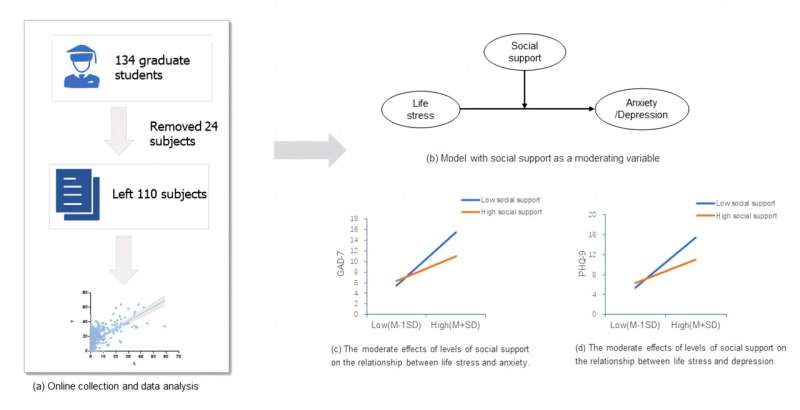Researchers study postgraduate students’ mental health during COVID-19 pandemic static managements

A team of researchers undertook a study of the mental health of postgraduate students during the COVID-19 pandemic static management. They determined that when the students received high-level social support, it lessened the stress, anxiety, and depression caused by the static management.
Their research findings are published in the journal Stress and Brain.
Since the arrival of COVID-19 in December 2019, researchers have studied, not only the impact of the pandemic on people’s physical health, but also its impacts on people’s mental health. Studies have already been conducted focusing on the relationship between anxiety, depression, and stress in children, undergraduate students, the elderly, and the general population.
However, scientists had not yet conducted studies focused on graduate students. Previous studies have shown that in general, postgraduate students have poorer mental health, compared to medical students and residents. So because of the COVID-19 pandemic, the research team viewed postgraduate students as an at-risk group that merited their study.
With the arrival of the first omicron variant strain in Shanghai in May 2022, many universities in the city went into static management, or campus enclosed management, for several months. The team focused their study on the postgraduate students at these universities impacted by the static managements.
Previous research showed that because of the static managements, most people had moderate to high levels of stress. The team conducted an online survey to assess the level of social support, stress, anxiety, and depression the postgraduate students at several Shanghai universities experienced during the pandemic static management period. The 110 students in the study completed a series of online questionnaires related to current life stress and social support, a generalized anxiety disorder survey, and an overall student health survey.
The researchers noted that the changes in daily routines, such as variations in sleep, physical activity and diet, brought on by the static management, could lead to chronic stress. These factors contributed to a long-lasting poor quality of life for the students. Chronic stress has proven to be closely related to diseases such as burnout and depression. “Life stress in the background of the COVID-19 pandemic would lead to obvious symptoms of anxiety and depression,” said Ti-Fei Yuan, Shanghai Jiao Tong University School of Medicine.
The team’s results showed that the interaction between life stress and social support had a strong predictive effect on the level of anxiety. A high level of social support can ease the impact of life stress on anxiety levels.
The team also investigated the influence of the students’ social support on the connection between life stress and depression. Their results showed that life stress and social support can be combined to predict depression level. A high level of social support can weaken the connection between life stress and depression. They noted that students with a higher level of social support had milder symptoms of anxiety and depression. These findings reveal the protective function of social support on a person’s mental health.
From a practical standpoint, the team acknowledges that graduate students would benefit from enhanced social support. Universities could provide services that improve the social support for graduate students. “Universities should encourage more social activities to enable more available social support, which would help to alleviate the risk of anxiety and depression during the campus static management management period,” said Yuan.
Source: Read Full Article
